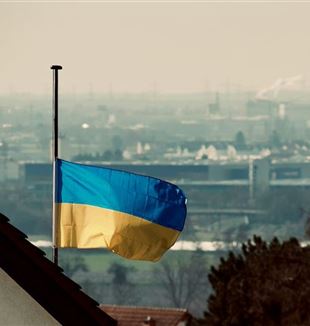
To not get used to the bombs
A teacher, a student “wounded” by the war in Ukraine, and an Oscar-winning film that is like a “punch in the stomach,” but also an invitation to rediscover the Pope's call for peace.This year, in one of the schools where I teach, a pupil suggested that the whole school watch the Oscar-winning documentary 20 Days in Mariupol, motivating his proposal as follows: “I believe that our educational institution has, in its own small way, a duty to do what it can so that the tragic situation of the Ukrainian people is not buried by a blanket of indifference and cynicism.”
I was very struck by his words, because in some way the Compagnia delle Opere's flyer on the European elections and peace recalls precisely this risk of indifference and habit into which we fall in the face of a war that is so close.
The reaction of students and faculty was varied. For some, the images were too stark and they preferred not to watch it, but many joined in. The viewing was a real punch in the stomach, many cried, including me, because in front of the images of death of Evangelina, a four-year-old girl, or of a 16-year-old boy who died under the bombs while playing soccer with friends, one cannot remain indifferent. We have become accustomed to the bombs and missiles on TV, but “seeing the aftermath is something else,” one of my students said.
The Pope’s words resonated strongly in me: “May the hostilities that cause immense suffering cease as soon as possible.”
In the 1990s, when I was 18 years old, I was in Slovenia with Fr. Vinko Kobal, and together with other young people we were helping refugees from the war in the former Yugoslavia. At one refugee camp, I was shocked at how many children there were. Now the war is near and we are almost used to it. Can one get used to or be indifferent to the deaths of children in Gaza, Rafah or Mariupol?
Ultimately, even the issue of the European elections is in danger of being reduced to “so who should I vote for?” Instead, I understand that much more is at stake: my humanity. The School of Community has helped me a lot, specifically chapter 7 point 3, which talks about alienation, when it gives the example of Churchill and the risk of man being dominated by ideologies, programming thoughts and feelings. Fr. Giussani says, “The politics of today are governed by this type of culture all over the world. It is for this reason that there must be a revolution for the defense of what is human, and this revolution can only come about under the banner of religiosity. It must be authentically religious, and therefore, with authentic Christians in the front lines.”
It is astonishing to see how we can continually fall into this alienation, into this indifference that is the child of a power that even accustoms us to thinking that producing weapons and delivering them instead of humanitarian aid is the most normal thing, as the documentary itself says. The war in Ukraine had already been going on for 10 years, had anyone noticed?
Read also - "The hug that reached your marrow"
I also realize that I am far from what the Pope continually asks of us: peace as the only solution. It amazes me, however, that the work of School of Community and the simple proposal of a student can take me out of this alienation, reawakening those fundamental questions in me, which put me on the path towards truth, goodness, and justice. As the Compagnia delle Opere's flyer says: “Now, the outbreak of new wars and the arms race tragically puts before us the risk that we face: if war were to spread we would witness the definitive and unappealable failure of the Union project, attacking the future of the entire human family, as Pope Francis constantly repeats. Even to accept this hypothesis as possible or even probable contradicts the ideal foundation on which Europe was built.”
I understand that the change that is needed is profound; what is at stake is not just the European elections, but the defense of the human.
Domenico, Cesena, Italy